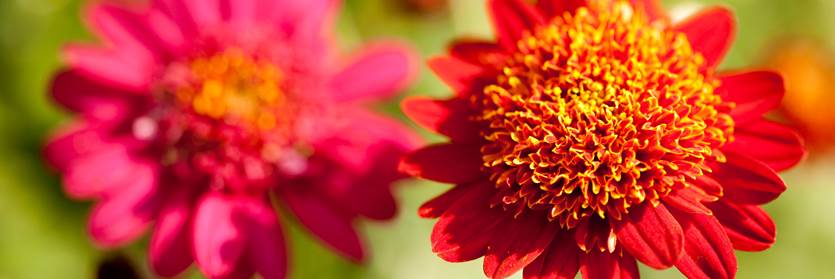Inside The New York Botanical Garden
Garden News
Posted in Garden News on December 7 2018, by Plant Talk
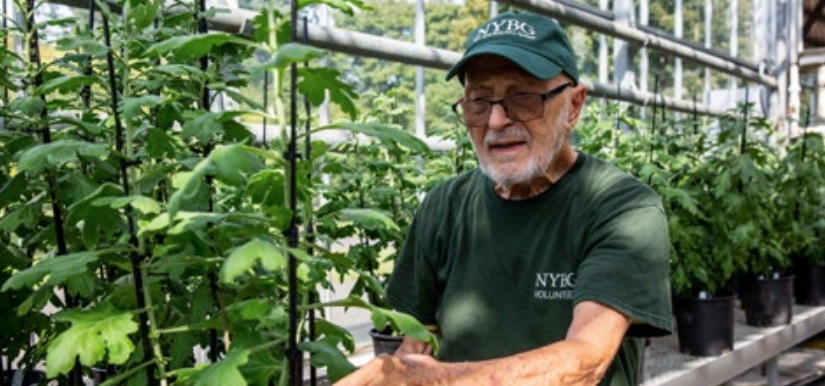
Started: 2005
Lifetime Volunteer Hours: 6,088
How long have you been a NYBG volunteer and what was the inspiration for becoming one?
After retiring from the Navy, I moved from Norfolk, Virginia, to Riverdale, New York, and saw an advertisement in The Riverdale Press from The New York Botanical Garden. I had volunteered at botanical gardens before and wanted to volunteer again at another garden. After visiting the Garden and learning about the diverse opportunities for volunteering, from helping out in the Children’s Adventure Garden to giving tours for visitors, I decided to sign up for the program.
Read More
Posted in Garden News on December 4 2018, by Plant Talk
James S. Boyer, Ph.D., is the Stavros Niarchos Foundation Vice President for Children’s Education at The New York Botanical Garden.
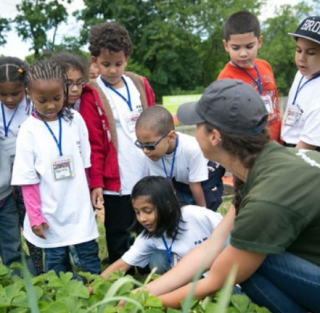 With funding from the New York City Council, NYBG’s Children’s Education department piloted a new and engaging multisession program in 2017–2018 with five local partner schools that have a long-term relationship with the Garden. These P–5 schools had the option of visiting the Garden—several times throughout the year—providing the opportunity for children to learn multiple garden-based concepts, while experiencing the seasonal changes in this natural landscape. Each session included garden-based, science and nature investigations, allowing children to explore the Garden in different seasons. These field trips provided opportunities to address grade-appropriate standards and practice developmentally appropriate process skills.
With funding from the New York City Council, NYBG’s Children’s Education department piloted a new and engaging multisession program in 2017–2018 with five local partner schools that have a long-term relationship with the Garden. These P–5 schools had the option of visiting the Garden—several times throughout the year—providing the opportunity for children to learn multiple garden-based concepts, while experiencing the seasonal changes in this natural landscape. Each session included garden-based, science and nature investigations, allowing children to explore the Garden in different seasons. These field trips provided opportunities to address grade-appropriate standards and practice developmentally appropriate process skills.
Read More
Posted in Garden News on November 27 2018, by Plant Talk
Judith Hutton is the Manager of Teacher Professional Development at The New York Botanical Garden.
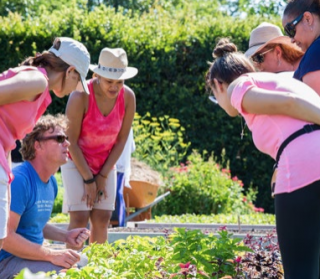 Now in its 24th year, the Garden’s Professional Development Program for Teachers reaches more than 3,000 teachers annually from the New York City and Tri-State area. Teachers participate in a range of high quality professional development, including customized workshops and Seasonal Institutes. Courses promote new pedagogy that goes beyond the classroom by utilizing outdoor and informal resources emphasizing real-life science learning.
Now in its 24th year, the Garden’s Professional Development Program for Teachers reaches more than 3,000 teachers annually from the New York City and Tri-State area. Teachers participate in a range of high quality professional development, including customized workshops and Seasonal Institutes. Courses promote new pedagogy that goes beyond the classroom by utilizing outdoor and informal resources emphasizing real-life science learning.
Seasonal Institutes are dynamic, intensive graduate-level courses, which aim to deepen content knowledge in science, increase comfort level in incorporating science across an interdisciplinary curriculum, and provide tools to use informal resources to support instruction. Science-rich experiences help students understand the natural world, use appropriate scientific principles and processes in making personal decisions, and ultimately engage intelligently in public discourse.
Read More
Posted in Garden News on November 13 2018, by Plant Talk
Esther Jackson is the Public Services Librarian and Samantha D’Acunto is the Reference Librarian for The New York Botanical Garden.
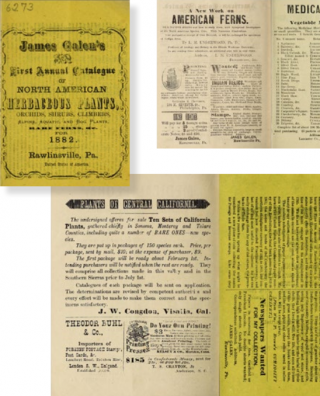 This past spring, LuEsther T. Mertz Library staff invited several NYBG Adult Education classes to view treasures from our special collections. The classes were given tours of the Library and the Rare Book Room where they viewed special collection titles related to their class subjects.
This past spring, LuEsther T. Mertz Library staff invited several NYBG Adult Education classes to view treasures from our special collections. The classes were given tours of the Library and the Rare Book Room where they viewed special collection titles related to their class subjects.
The students from the class Orchid Next Door with Dr. Matthew Pace joined Library staff for a viewing of the First Annual Catalogue of North American herbaceous plants, orchids… (1882) by James Galen, The orchid hunters: a jungle adventure (ca. 1939) by Norman MacDonald, and many other exciting titles. The Hidden World of Lichens class with Dr. James Lendemer joined the Library staff in two sessions to view materials related to the chronological history of lichenology through various materials in the Library’s collection. Other sessions included a viewing of 17th- century bulb literature for students of Landscape Plants: Bulbs! with instructors Michael Hagen and Marta McDowell; a review of 19th-century, hand-colored floral illustrations for the students of Designing with Tropical Flowers with Bridget Vizoso; and a peek at the Library’s mounted-insect collection for the students of Entomology with Tam Nguyen.
Read More
Posted in Garden News on November 9 2018, by Plant Talk
Jessica Arcate Schuler is the Director of the Thain Family Forest at The New York Botanical Garden.
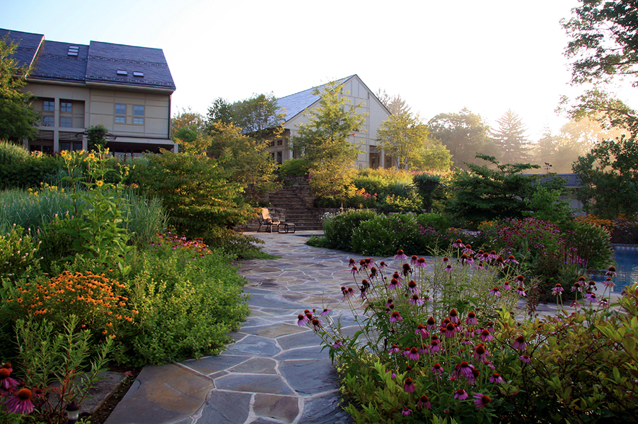
Many gardeners view their gardens as separate and isolated from the larger landscape. In reality, the larger landscape is a connected patchwork of ecosystems that support life. Having an invasive species in our garden does impact a local natural area, planting a diversity of plants including native species benefits wildlife, efficiently managing stormwater, fertilizer, plant health, compost and water use determine a garden’s resilience. On November 28, Cultivating a New Garden Ethic will showcase three distinguished speakers, Larry Weaner, Scott Freeman, and Jan Merryweather, to explore how gardening practices can create beauty and help heal the larger environment.
Read More
Posted in Garden News on November 2 2018, by Plant Talk
By Esther Jackson, Public Services Librarian; Samantha D’Acunto, Reference Librarian; Daniel Atha, Director of Conservation Outreach; and Brian M. Boom, Ph.D., Vice President for Conservation Strategy and Bassett Maguire Curator of Botany.
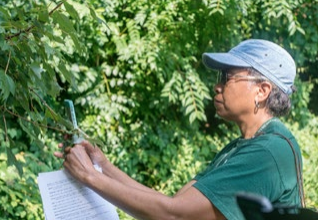 This past spring, LuEsther T. Mertz Library staff organized a workshop on how to use the popular website and app iNaturalist. The workshop was held in preparation for the 2018 City Nature Challenge, a global competition to see which city could record the most number of observations in four days, April 27–30. New Yorkers turned out in force, including NYBG staff, volunteers, Members, and the general public. Daniel Atha, Director of Conservation Outreach, facilitated the two-hour class, teaching attendees about different features of the app, including how to observe, suggest identifications for the observations of others, and search the iNaturalist database for information. (New York City came in seventh place overall for the City Nature Challenge.)
This past spring, LuEsther T. Mertz Library staff organized a workshop on how to use the popular website and app iNaturalist. The workshop was held in preparation for the 2018 City Nature Challenge, a global competition to see which city could record the most number of observations in four days, April 27–30. New Yorkers turned out in force, including NYBG staff, volunteers, Members, and the general public. Daniel Atha, Director of Conservation Outreach, facilitated the two-hour class, teaching attendees about different features of the app, including how to observe, suggest identifications for the observations of others, and search the iNaturalist database for information. (New York City came in seventh place overall for the City Nature Challenge.)
Because of the popularity of the first workshop, the Library offered a second iNaturalist workshop in August. The workshop focused on website and desktop navigation, facilitated again by Daniel Atha. Workshop attendees learned how to navigate the iNaturalist website, including the New York City EcoFlora project, and how to make new observations using their smartphones and tablets. Elementary, middle, and high school teachers were among the workshop’s attendees, which also included NYBG staff, volunteers, and Members. All participants were encouraged to partake in a short “virtual scavenger hunt” to help test out their newly acquired iNaturalist knowledge. Questions included how many plant observations have been made in Bronx County, how many total observations have been made in New York City, and the most-frequently observed animal and plant species in the Bronx. Those who completed the scavenger hunt first were gifted a small Library swag bag filled with iNaturalist and NYBG-related stickers, notebooks, and pens.
In addition to the New York City EcoFlora workshops, this summer the Library staff collaborated with Kristine Paulus and Becky Thorp of the Plant Records Office to offer a workshop on NYBG’s Garden Navigator. In October Library staff hosted a Women in Science Wikipedia edit-a-thon in collaboration with the Untold Stories project at the American Museum of Natural History.
This article originally appeared as part of a series on responsible citizenry in the 2018–2019 issue of Garden News, NYBG’s seasonal newsletter. For further reading, view the issue online and discover a sampling of stories about our current efforts and activities that promote, engage, and support active and responsible citizenry on local, regional, and global levels.
Posted in Garden News on November 2 2018, by Plant Talk
Stephan Chenault is The New York Botanical Garden’s Director of Science Development.
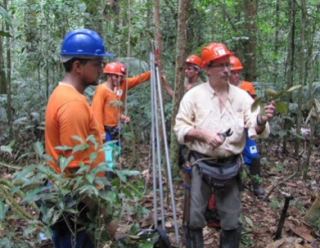 Douglas Daly, Ph.D., B. A. Krukoff Curator of Amazonian Botany and Director of the Institute of Systematic Botany at NYBG, has spent several years working in collaboration with the Brazilian Forest Service to conduct extensive training and certification programs in the Amazon for traditional forestry personnel, called mateiros, forest-born but town-educated. His efforts have promoted conservation of Amazonian rain forests by ensuring far more accurate representation of tree diversity in forest inventories, and by assisting timber operations certified for sustainability. More than 100 mateiros who work in national forest concessions, universities, nongovernmental organizations, and Brazilian government environmental agencies have been trained thus far.
Douglas Daly, Ph.D., B. A. Krukoff Curator of Amazonian Botany and Director of the Institute of Systematic Botany at NYBG, has spent several years working in collaboration with the Brazilian Forest Service to conduct extensive training and certification programs in the Amazon for traditional forestry personnel, called mateiros, forest-born but town-educated. His efforts have promoted conservation of Amazonian rain forests by ensuring far more accurate representation of tree diversity in forest inventories, and by assisting timber operations certified for sustainability. More than 100 mateiros who work in national forest concessions, universities, nongovernmental organizations, and Brazilian government environmental agencies have been trained thus far.
Recently Dr. Daly was awarded a generous grant of $200,000 over two years from the Tinker Foundation for a new but related project, Equipping Community Participation in Management and Monitoring of Amazon Forests. This initiative will build on past capacity-building accomplishments of the NYBG project team, by taking a novel approach of training community members in tree identification, forest inventory, and monitoring in protected areas. The project is a collaboration of NYBG with the Chico Mendes Biodiversity Institute (ICMBio), the Rio de Janeiro Botanical Garden, and the Forest Products Laboratory of the Brazilian Forest Service. These efforts aim to conserve Amazonian biodiversity and establish community members as stakeholders in protected forest areas by ensuring that local communities benefit from this initiative in terms of both livelihoods and the local economy.
This article originally appeared as part of a series on responsible citizenry in the 2018–2019 issue of Garden News, NYBG’s seasonal newsletter. For further reading, view the issue online and discover a sampling of stories about our current efforts and activities that promote, engage, and support active and responsible citizenry on local, regional, and global levels.
Posted in Garden News on October 17 2018, by Plant Talk
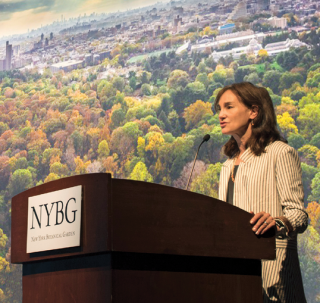 On July 1, 2018, Carrie Rebora Barratt, Ph.D., became the ninth CEO and President of The New York Botanical Garden and the first woman to hold the position. She came to the Garden following a distinguished career at The Metropolitan Museum of Art, where she worked as a curator and transitioned from research and scholarship to governance and administration, most recently serving since 2009 as Deputy Director, leading visitor-focused, mission-aligned initiatives for the institution during a transformational period in Museum’s history. At NYBG, Dr. Barratt brings her focus to the care and presentation of the living collections and special exhibitions. Her track record for enhancing visitor engagement matches the Garden’s reputation for groundbreaking scientific research and conservation programs; creative educational programs connecting art to science and human life to living collections, with enhanced offerings from pre-K through post-graduate studies; and vibrant exhibition and public programs that serve ever-growing and diverse audiences.
On July 1, 2018, Carrie Rebora Barratt, Ph.D., became the ninth CEO and President of The New York Botanical Garden and the first woman to hold the position. She came to the Garden following a distinguished career at The Metropolitan Museum of Art, where she worked as a curator and transitioned from research and scholarship to governance and administration, most recently serving since 2009 as Deputy Director, leading visitor-focused, mission-aligned initiatives for the institution during a transformational period in Museum’s history. At NYBG, Dr. Barratt brings her focus to the care and presentation of the living collections and special exhibitions. Her track record for enhancing visitor engagement matches the Garden’s reputation for groundbreaking scientific research and conservation programs; creative educational programs connecting art to science and human life to living collections, with enhanced offerings from pre-K through post-graduate studies; and vibrant exhibition and public programs that serve ever-growing and diverse audiences.
Read More

